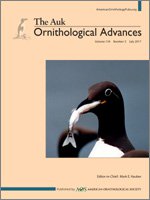Brood parasitism incurs severe fitness costs for hosts. Diverse host adaptations to avoid parasitism exist at various stages of the host breeding cycle, but the literature suggests that egg-stage defenses are the most evolved. Fitness costs of parasitism would be minimized if hosts avoided parasitism prior to egg laying, but it remains unclear whether hosts are able to reduce parasitism risk via informed habitat choices. We conducted a playback experiment to examine the capability of forest passerine birds to perceive vocal cues of the Common Cuckoo (Cuculus canorus) to estimate local parasitism risk and adjust their breeding-habitat choices accordingly. The density of open-nesting host species was considerably lower in sites of high perceived parasitism risk than in control sites. Hosts thus seem able to reduce parasitism risk through informed breeding-habitat choices, but this behavior is restricted to open-nesting hosts. Cavity-nesting hosts did no t respond to the simulated increase in parasitism risk, nor did bird species that are not known as regular Common Cuckoo hosts. Informed habitat selection as an adaptation against parasitism may have important implications for parasite–host coevolutionary interactions, via reduced selection for later-stage host adaptations, and for bird community structure in general.
How to translate text using browser tools
10 May 2017
Reducing cuckoo parasitism risk via informed habitat choices
Jere Tolvanen,
Jukka T. Forsman,
Robert L. Thomson

The Auk
Vol. 134 • No. 3
July 2017
Vol. 134 • No. 3
July 2017
brood parasitism
Coevolution
Common Cuckoo
eavesdropping
front-line defenses
informed habitat selection




